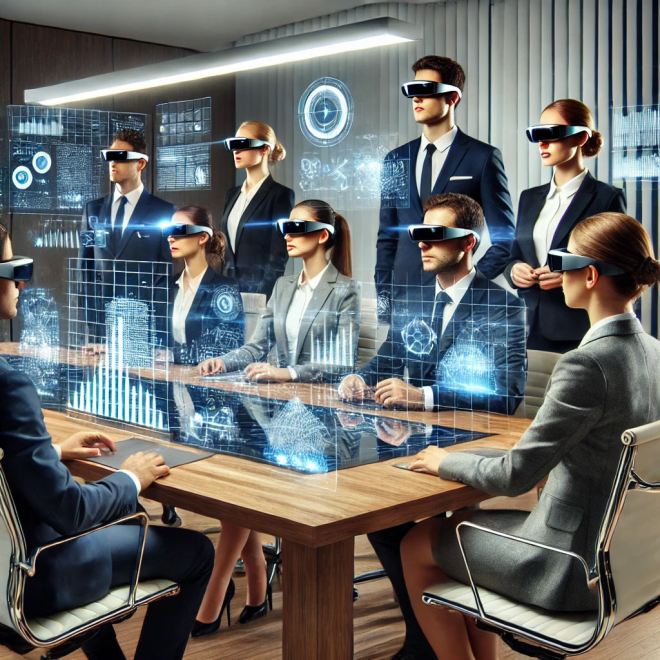A Brief History of AR Glasses: From Sci-Fi to Reality
The concept of AR glasses has been a long-standing dream within the tech industry. The earliest attempt to bring AR to the masses came with Google Glass in 2013. While innovative for its time, Google Glass was ahead of the curve—lacking the technical sophistication, user interface, and social acceptance needed to make it mainstream. The device was met with privacy concerns, a limited field of vision, and minimal practical applications, leading to its commercial failure.
Despite this setback, the vision for AR continued to evolve. Microsoft introduced the HoloLens in 2015, targeting enterprise use with more advanced technology and applications in industries like manufacturing, healthcare, and education. However, the high price point and bulky design meant it wasn’t ready for mass consumer adoption.
The evolution of AR technology reached a turning point with Meta’s recent unveiling of the Orion AR glasses. Unlike its predecessors, Meta’s Orion is built on years of technological advancement, miniaturization, and AI integration. By combining a sleek design with powerful AI capabilities, Orion represents the first real chance for AR to enter mainstream consumer life.
What Sets Meta's Orion AR Glasses Apart?
Meta’s Orion AR glasses are not just another attempt to integrate augmented reality into our lives—they are a sophisticated blend of AR, AI, and metaverse technologies designed to augment the user experience in unprecedented ways. Here’s how Orion differentiates itself:
1. Advanced AI Integration: Meta has woven AI into the fabric of Orion's functionality, allowing the glasses to learn and adapt to user behavior, preferences, and interactions. This makes the device more intuitive and capable of delivering personalized experiences.
2. Seamless AR Interface: The Orion glasses provide an augmented reality interface that blends seamlessly with the real world, making the overlay feel like a natural extension of the environment. This is a significant leap from the clunky interfaces of earlier AR devices.
3. Metaverse Integration: As Meta pivots towards becoming a leader in the metaverse, Orion glasses serve as a bridge between the physical and digital realms. Users can navigate, interact, and engage with the metaverse while still being present in the real world—a dual experience that offers vast potential for marketing applications.
Applying Orion AR Glasses to Marketing Strategies
The unveiling of Meta's Orion AR glasses has monumental implications for marketing, introducing innovative ways to create engaging, personalized, and interactive campaigns. Here are several strategic avenues where Orion could redefine marketing approaches:
1. Hyper-Personalized Advertising
One of the most promising applications of Orion AR glasses lies in delivering hyper-personalized advertising experiences. With AI-driven insights, marketers can craft ads that respond to a user’s environment, preferences, and real-time activities. For example, a user walking down a city street might see virtual billboards that change based on their shopping habits, recent searches, or even mood, offering discounts or promotions tailored to their interests.
This level of personalization elevates the ad experience from passive viewing to active engagement, significantly increasing the likelihood of conversion. Furthermore, the integration of real-time data means that ads can adapt instantaneously, providing users with dynamic and relevant content that feels less intrusive and more like a natural part of their journey.
2. Augmented Product Experiences
Orion’s capabilities open doors for brands to create immersive product experiences. Consider a furniture company allowing customers to visualize how a couch would look in their living room through AR. Fashion brands could enable users to "try on" clothes or accessories virtually before making a purchase, reducing the friction between consideration and conversion.
This kind of experiential marketing taps into a consumer’s desire for tactile and visual interaction, providing a richer sense of the product’s value. By allowing customers to engage with products in their own environment, brands can build a deeper connection and trust, leading to higher sales and reduced return rates.
3. Enhanced Retail Experiences
Retailers can leverage Orion AR glasses to create in-store experiences that blend digital convenience with physical presence. Shoppers wearing Orion glasses can access product details, reviews, or even step-by-step assembly instructions simply by looking at an item. Retailers could also provide real-time offers or loyalty rewards that appear directly in the shopper's field of vision, enhancing the sense of value and immediacy.
For online retailers, the potential for AR-powered “virtual stores” allows users to explore and shop as if they were physically present, making e-commerce more engaging and interactive. This blending of physical and digital commerce could redefine omnichannel marketing strategies, driving traffic to both online and offline channels.
4. Revolutionizing Events and Experiential Marketing
The event industry, one of the sectors hardest hit by recent global challenges, stands to gain significantly from AR technology. Imagine attending a conference where Orion glasses guide you through virtual networking sessions, personalized product showcases, or interactive brand experiences—all layered onto the physical event space. This convergence of virtual and physical elements can create richer, more memorable interactions that increase brand engagement and loyalty.
Marketers can take advantage of this by offering branded AR experiences that attendees can engage with in real-time, leaving a lasting impression and increasing the event's overall impact.
Challenges and Considerations for Marketers
While the opportunities with Orion AR glasses are vast, it’s essential to approach this technology with a strategic mindset:
- User Experience: One of the critical factors in ensuring the success of AR marketing will be creating experiences that add value without overwhelming the user. Advertisements should be contextually relevant and enhance, rather than interrupt, the user experience.
- Privacy and Data Ethics: The fusion of AR and AI presents challenges regarding data collection, privacy, and consent. As Orion integrates deeper into users' lives, marketers must be transparent and ethical in how data is gathered and utilized, building trust and safeguarding consumer rights.
- Content Creation and Integration: Traditional marketing content may not translate well into an AR environment. Marketers must rethink how they create and present content, investing in 3D models, interactive animations, and immersive storytelling techniques to fully leverage the capabilities of Orion.
The Future of AR in Marketing Strategy
The introduction of Meta’s Orion AR glasses marks the dawn of a new era for marketing strategies, one that requires adaptability, creativity, and an understanding of emerging technologies. As AR moves from a novelty to a practical tool for engagement, brands that invest in experimenting with this technology today will be the ones that lead tomorrow’s marketing landscape.
The potential for AR in marketing lies not just in capturing attention but in creating experiences that resonate with consumers on a deeper, more personal level. The ability to blend digital and physical worlds offers an opportunity to redefine customer journeys, engagement strategies, and the very essence of brand storytelling.
In the end, the question is not whether AR will transform marketing—it’s how quickly and effectively brands can harness this technology to create meaningful, memorable, and measurable experiences. Meta's Orion AR glasses may be the catalyst that shifts marketing strategy from the screen into the real world, delivering a new reality where the possibilities are limited only by our imagination.
 images/bannerimages/Blog-Banner.jpg
images/bannerimages/Blog-Banner.jpg 



